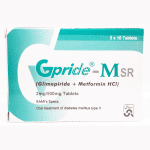delivery within 72 Hours
Gpride Msr 1/500mg Tablet
₨ 340
Product Title: GPRIDE MSR 1/500MG TABLET
Generic: Glimepiride , Metformin
Pack Size: 30s
Product Form: TABLETS
Delivery within: 2 to 3 working days across Pakistan
Shipping & Delivery
-
Courier delivery
Our courier will deliver to the specified address
2-3 Days
From Rs 250
-
Free 15-Day returns

Black Friday Blowout!
Description
Gpride Msr 1/500mg Tablet is a combination medication comprising Glimepiride and Metformin as its active ingredients. Glimepiride belongs to the sulfonylurea class of drugs, while Metformin is a biguanide antidiabetic agent. This combination tablet is used for the management of type 2 diabetes mellitus to improve glycemic control.
Ingredients:
- Glimepiride (1mg): Glimepiride stimulates insulin release from pancreatic beta cells, thereby lowering blood sugar levels.
- Metformin (500mg): Metformin improves insulin sensitivity and decreases hepatic glucose production, resulting in reduced blood sugar levels.
Uses:
Gpride Msr 1/500mg Tablet is indicated for the treatment of type 2 diabetes mellitus. It helps control blood sugar levels in patients whose diabetes cannot be adequately managed with diet, exercise, or monotherapy with either Glimepiride or Metformin alone.
Side Effects:
- Hypoglycemia: The use of Gpride Msr 1/500mg Tablet may lead to low blood sugar levels (hypoglycemia), especially if taken without sufficient food intake or if the dosage is too high.
- Gastrointestinal Upset: Some individuals may experience gastrointestinal side effects such as nausea, diarrhea, or abdominal discomfort due to Metformin.
- Hypersensitivity Reactions: Allergic reactions to either Glimepiride or Metformin components may occur, presenting as rash, itching, swelling, or difficulty breathing.
- Lactic Acidosis: Metformin may rarely cause a serious condition called lactic acidosis, especially in patients with kidney or liver problems, which requires immediate medical attention.
Precautions:
- Renal Impairment: Use with caution in patients with renal impairment, as Metformin is excreted by the kidneys and may accumulate in patients with impaired renal function, leading to lactic acidosis.
- Hepatic Impairment: Use with caution in patients with hepatic impairment, as both Glimepiride and Metformin are metabolized by the liver.
- Hypoglycemia Risk: Patients should be educated about the signs and symptoms of hypoglycemia and instructed on appropriate measures to manage low blood sugar levels.
- Pregnancy and Breastfeeding: Gpride Msr 1/500mg Tablet should be used with caution during pregnancy and breastfeeding, and only if the potential benefits outweigh the risks to the mother and fetus or infant. Close monitoring of blood sugar levels is essential during these periods.
When Not to Use:
Gpride Msr 1/500mg Tablet is contraindicated in patients with:
- Known hypersensitivity to Glimepiride, Metformin, or any component of the tablet.
- Type 1 diabetes mellitus or diabetic ketoacidosis.
- Severe renal or hepatic impairment.
- Pregnancy or breastfeeding (unless the potential benefits outweigh the risks).
FAQ:
- How should Gpride Msr 1/500mg Tablet be taken?
- Gpride Msr 1/500mg Tablet is usually taken orally with meals to reduce gastrointestinal side effects. The dosage may vary depending on the patient’s response to treatment and blood sugar levels.
- What should I do if I miss a dose of Gpride Msr 1/500mg Tablet?
- If a dose is missed, it should be taken as soon as remembered, unless it is almost time for the next scheduled dose. Patients should not double the dose to make up for a missed dose and should continue with the regular dosing schedule.
- Can Gpride Msr 1/500mg Tablet be used alone or in combination with other antidiabetic medications?
- Gpride Msr 1/500mg Tablet is a combination therapy and is usually used when blood sugar control cannot be achieved with monotherapy. It may be used alone or in combination with other antidiabetic medications, depending on the patient’s response to treatment.
- Is Gpride Msr 1/500mg Tablet safe for elderly patients?
- Gpride Msr 1/500mg Tablet can be used in elderly patients with caution, as they may be more susceptible to the effects of hypoglycemia. The dosage may need adjustment based on renal function and other factors.
- What are the possible drug interactions with Gpride Msr 1/500mg Tablet?
- Gpride Msr 1/500mg Tablet may interact with certain medications, such as other antidiabetic drugs, corticosteroids, or beta-blockers. It is essential to inform the healthcare provider about all medications being taken to avoid potential interactions.
Customer Reviews
You must be logged in to post a review.










Reviews
Clear filtersThere are no reviews yet.